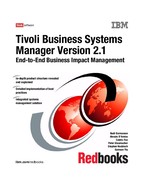
26 Tivoli Business Systems Manager Version 2.1: End-to-End Business Impact Management
2.1 Product structure
The major components of the IBM Tivoli Business Systems Manager are shown
in Figure 2-1.
Figure 2-1 IBM Tivoli Business Systems Manager product structure
IBM Tivoli Business Systems Manager has three major components:
? Base services, which includes database storage for current and historical
data, event receiving and handling services, as well as functions to provide
the graphical client interface of the product. As the name indicates, this is the
base function that enables you to process events coming from the mainframe,
the distributed environment, or both. IBM Tivoli Business Systems Manager
uses Windows servers as its platform.
? Distributed resources feeds, which provides the support for the distributed
environment including Tivoli Management Framework and other IBM software
and third-party software. Some of the distributed sources include:
– IBM Tivoli Enterprise Console 3.6.2 and 3.7.1
– IBM Tivoli Management Framework 3.6.1, or later
– IBM Tivoli Workload Scheduler 8.1 (Host and Distributed)
– IBM Tivoli NetView (Distributed)
Base Services
Database server
Event server
Propagation server
Console server
History server
others
TBSM
Servers
SNA (LU6.2)
TCP/IP
TCP/IP
Mainframe Resources Feeds
Applications
Batch systems
Database systems
Online systems
Operating system
Storage systems
Distributed Resouces Feeds
Tivoli Enterprise
Console
IBM Tivoli
Monitoring
Tivoli
Instrumentation
Service (AMS)
OS/390
Chapter 2. Components and functions 27
– IBM Tivoli Monitoring
– IBM Tivoli Monitoring for Databases, Applications, Business Integration,
Web Infrastructure, and Collaboration
– Tivoli Distributed Monitoring (Classic)
– BMC Patrol 3.4
– CA TNG 2.1, 2.2, and 2.4
– NetIQ AppManager 4.02
? Mainframe resources feeds (often referred to as Source/390), which enables
the processing of events from multiple z/OS subsystems and applications.
The enterprise edition must run some pre-discovery processes before the
object creation and event propagation of the objects can work. The IBM Tivoli
Business Systems Manager enterprise edition enables you to manage the
following entities on your z/OS systems:
– Applications
– Batch systems
– Database systems
– Online systems
– Operating systems
– Storage systems
Some of the z/OS sources include:
– IBM CICS® Transaction Server 1.3, 2.1, and 2.2
– IBM Tivoli NetView for OS/390 1.3 and later
– IBM Tivoli Operations, Planning, and Control 2.2 and 2.3
– IBM Tivoli Workload Scheduler for z/OS 8.1
– IBM DB2 Performance Monitor Versions 5, 6, and 7
– IBM WebSphere®
®
OS/390 3.5, 4.0, and 4.0.1
– IBM Tivoli Storage Management Systems 1.4 and 1.5
– IBM Storage Management Systems for OS/390 2.10
– IBM System Automation for OS/390 1.3 and 2.1
– BMC Mainview for MVS™™ 2.5.01 or later
– BMC Mainview for CICS 5.4.0 or later
– BMC Mainview for IMS 3.2.0 or later
– BMC Mainview for DB2 7.1 or later
– BMC Control M 5.1.4
– BMC Auto Operator 6.0 and 6.1
– Landmark TMON for MVS 2.0 or later
– Landmark TMON for CICS 2.0 or later
– Landmark TMON for DB2 3.2 or later
– CA/7 3.2 and 3.3
– CA OPS/MVS 4.2, 4.3, and 4.4
– Candle Omegamon
1
II for MVS Versions 500 and 520
– Candle Omegamon II for CICS Versions 500 and 520
1
IBM Tivoli Business Systems Manager currently only supports Omegamon classic interface
28 Tivoli Business Systems Manager Version 2.1: End-to-End Business Impact Management
– Candle Omegamon II for DB2 Versions 500 and 520
– Candle Omegamon II for IMS Versions 500 and 520
– Candle AF/Operator 3.1.0 and 3.2.0
– ASG Zeke 4.5 and 5.1
Interfaces between these components and IBM Tivoli products will be discussed
in greater detail in the following sections.
Typically IBM Tivoli Business Systems Manager base services is installed on six
Windows machines, with the name and role of each Windows machine as
follows:
Host Integration server Acts as a conduit for Source/390 components in z/OS
to the IBM Tivoli Business Systems Manager base
services. It runs on Microsoft Host Integration Server
and establishes a session with z/OS eNetwork
Communication Server or VTAM® on the host, and it
serves the SNA client on the event handler server to
enable information exchange. It was called SNA server
in previous versions. This server is not needed for
TCP/IP connection.
Event Handler server Receives, processes, and reacts to z/OS events. This
machine requires SNA client or Host Integration client
software, even when you run only TCP/IP connection.
Database server Provides the database repository, which is the heart of
IBM Tivoli Business Systems Manager processing. It
hosts the object repository in the Microsoft SQL Server
database.
Console server Serves the client workstation connections. (This used
to be called Application server.)
Propagation server Processes events and calculates the necessary
propagation action.
History server Maintains an audit trail of all actions and events acted
on by IBM Tivoli Business Systems Manager on a SQL
server database for reporting and analysis purposes. It
contains replicated data from the database server.
Additonal servers are needed to provide optional functions:
Web console server Provides the user with a Web-based administrative
console to IBM Tivoli Business Systems Manager. The
Web console differs in appearance and behavior from
the console. It runs in kiosk mode, the mode of a Web
browser without any browser controls (such as the
..................Content has been hidden....................
You can't read the all page of ebook, please click here login for view all page.
